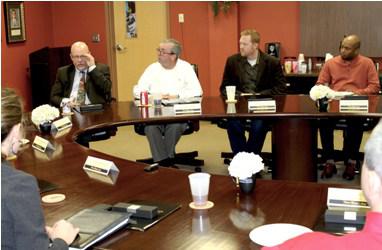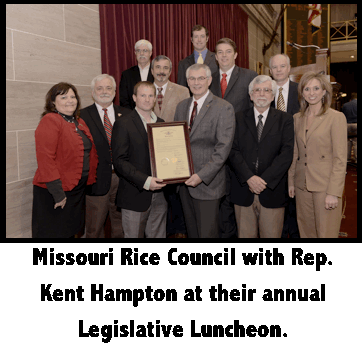
Submitted by
Beth Farrah, SMT Writer
As we approach the final 5 weeks of session, there are issues that you may or may not be aware of that should be of importance to you as a citizen of the state of Missouri. Listed below are two such issues.
House Urges Koster to Protect Missourian’s Religious Liberties
The Missouri House took action this week to encourage Attorney General Chris Koster to act in the best interest of Missourians by protecting their religious and conscience rights. House Concurrent Resolution 35 was filed in the wake of the errant US District Court’s decision that sections of Senate Bill 749 – overwhelmingly passed by the General Assembly after being vetoed by the Governor – was unconstitutional.
What was SB 749?
Senate Bill 749 provided employers the protections needed after the congress and the president moved to violate the rights of millions of Americans in requiring them to provide insurance coverage for anti-life forms of “healthcare” for their employees regardless of their religious objections.
If you’ve been minding the state news wires, you’ve no doubt heard the accusations that the Missouri Department of Revenue, which operates the Division of Motor Vehicles, has been scanning, storing, and sharing private information with the federal government regarding our citizens who can carry concealed weapons. The original complaint came from a Stoddard County resident who did not wish for their information to be scanned at the local DMV. On April 10, the Missouri State Highway Patrol admitted that in fact they had requested on two occasions the complete list of Missouri CCW holders and they had forwarded that information on to the federal government.
There are a variety of reasons why this issue is premier. First, it’s against the law. The Missouri General Assembly, in 2009, passed HB 361 which specifically states “no citizen of this state shall have his or her privacy compromised by the state or agents of the state.”
Second, while the government might have good interest in certain data at the group level (this helps when they are tracking and mitigating disease, for example), I can think of no good reason the government should be pinpointing CCW holders individually. Having a CCW is not a crime or grounds for an investigation.
What Are We Doing to Help?
The House has responded with House Bill 787, which would further prohibit the Department of Revenue from retaining copies of source documents used to obtain driver's licenses and nondriver's licenses. On the Senate side, Senator Kurt Schaefer (R-Columbia) has led the investigative charge and continues to garner information from the Nixon Administration regarding this apparent breach of privacy and trust.
My office continues to receive a variety of concerns from constituents regarding this evolving issue. I’m committed to ensuring your government is responsible in protecting your privacy. Let me reaffirm that your local fee office has not done anything wrong. They were only following instructions from the Department of Revenue in this new process of scanning documents.

I was honored to host the nine students who attended the Sophomore Pilgrimage (photo at right). Those attending were Bailey Burton, South Pemiscot High School; Kirsten Flowers, Cooter High School; Maegan Jones, Southland High School; Sarah Beth Prater, Caruthersville High School; Matthew Campbell, Campbell High School; Zachary Provance, Clarkton High School; Dalton Whitfield, Delta C-7 High School; Abigail McMullan, Kennett High School; and Katie Jones, Senath-Hornersville High School.
As always, it is an honor to serve you in the Missouri House. If you would like to discuss any issue, please call 573-751-3629. You can also email me at Kent.Hampton@house.mo.gov. I look forward to hearing from you.

Submitted by
Beth Farrah, SMT Writer
Poplar Bluff, Missouri - During a meeting led by Sen. Doug Libla (R-Poplar Bluff) on Friday, April 5, at Three Rivers College, Poplar Bluff R-I Superintendent Chris Hon [left] tells a group of Missouri lawmakers—including [to right] Sens. Joe Keaveny and Jason Holsman; and Rep. Courtney Allen Curtis—about the school district’s digital transformation. Each junior high student will be issued a MacBook Air in August, and high schoolers will receive individual laptops during the 2014/15 school year under the one-to-one initiative recently approved by the Board of Education.
Also present were Reps. Steve Cookson, Todd Richardson and Noel Torpey; former legislators Franc Flotron and Billy Pat Wright; officials from Three Rivers and SRG Global of Portageville; and other regional leaders.

Submitted by
Beth Farrah, SMT Writer
Jeffseron City, Missouri - Missouri Secretary of State Jason Kander today announced that the Missouri State Archives is working in conjunction with FamilySearch to create a free index to more than three million of the state's marriage records, from the territorial period through December 31, 1969.
Volunteers interested in assisting with online indexing of marriages are encouraged to contact the Missouri State Archives volunteer coordinator atarchvol@sos.mo.gov or (573) 751-3280. This effort will make the majority of Missouri's marriage records accessible to researchers around the world. Although the records are now available at the county level and on microfilm at the Missouri State Archives, this project will create the first free, online statewide index. Once accessible through the Missouri Digital Heritage website, the index will link to digital images of the actual records, allowing instant access at no cost.
"Marriage records contain a wealth of information for genealogists and family historians," Kander said. "The index created by this project will join the Missouri Death Certificates, the Supreme Court of Missouri Historical Records and other very useful collections on Missouri Digital Heritage."
Marriage records typically include the names of the bride, groom, person officiating the ceremony and witnesses; the location and date; and occasionally ages, parents' names and other interesting details. They provide a significant amount of information for those trying to learn more about their family history and are particularly important in researching maternal family lines where maiden names are hard to determine without documentation.

Dee Loflin, Manager/Writer SMT
Jefferson City, Missouri - As the warm gentle breeze and the bright sunshine have made its way, it appears the groundhog from Pennsylvania has been given a stay of execution. People are moving activities to the outdoors, many mowing yards, planting gardens, baseball takes front stage on the sport scene, and farm equipment in the fields are preparing for a new year. The color green seems dominant now as the freshness of a new beginning occurs.
Several items to make you aware of, my assistant Shana and her husband, Clay, just celebrated the arrival of a new baby daughter this week and all are doing well. I’m so fortunate to have Irene Foster filling the role and meeting the needs of our constituents of the 150th District.
The Missouri Solution: Market-Based Medicaid Transformation
As we undertake the challenge of transforming Missouri’s Medicaid system, there are several key components that are critical to making the system the high-quality safety net it was meant to be:
Encourage free-market principles and competition to lower costs. Give Medicaid recipients the power to choose the plan that best fits their situation.
Incentivize preventative care.
Promote price transparency to allow recipients to shop for the most cost-effective medical solutions.
Demand less federal oversight and more flexibility. Empower our state to adapt the program to meet the needs of Missouri’s growing population and an ever-evolving health care industry.
Reaffirm Medicaid’s original purpose: to serve as a safety net for our most vulnerable citizens.

Medicaid was never meant to provide healthcare to everyone. Rather than expand the pool of recipients who receive increasingly diminished services, we need to transform Medicaid into a system that ably provides the highest quality care to those who need it most.
The bill, HB 700, would move private insurers into a position of greater competition to provide coverage for low-income Missourians. It would empower Missourians, turning recipients into participants who actively make health care decisions and not wait until their health care needs require the emergency room
House Supports Military Veterans with HB 168
When veterans return home from service, they often make the decision to advance their education in support of their careers and families. Unfortunately, our public school system has residency requirements that sometimes force our returning veterans to pay out-of-state tuition rates.
What Does It Do?
HB 168 waives residency requirements for all separating service members who are applying to our public four year institutions. It also waives those same requirements for our 2 year colleges so that the service member will receive the “in-district” rate rather than the higher “out-district” rate.
Consent Bills Move to the Senate
This week the Missouri House took up its consent bill calendar. Consent bills must be considered non-controversial, cost nothing to implement, and not reduce revenues. While these bills may not bring overarching reform, they represent Missouri’s goals, values and commitments. The following list is a small sampling of consent bills that have passed the House this session.
HB 334 exempts children working on family farms from child labor laws. Farming parents depend on their children to help out with the family business, and kids gain lifelong skills and responsibility. Agriculture is Missouri’s biggest industry and this measure reaffirms the legislature’s commitment to continue our tradition of family owned and operated farms.
HB 440 enables cottage food producers to keep on selling without health department inspections. This means that home-canned jelly and home-dried herbs, among other products, can continue to be sold at farmers’ markets, fairs, and to friends, without government intervention.
Currently, counties are only allowed to increase their budgets annually, but not decrease them. HB 451 allows counties to amends their budgets during the middle of the fiscal year, if revenues decline dramatically. This allows counties to responsibly act in times of economic crises. Counties have no power other than that granted by the state, and so we want to grant them this power to keep themselves afloat in tough times.
The Missouri Rice Council held its annual legislative luncheon and it was an honor for me to present them with a courtesy resolution. Pictured with me are Representative Donna Lichtenegger, Representative Dennis Fowler, Chris Barry, Gary Murphy, Representative Shelley Keeney, Representative Steve Cookson, Representative Todd Richardson, Greg Yielding, BJ Campbell and Alex Clark.
As always, it is an honor to serve you in the Missouri House. If you would like to discuss any issue, please call 573-751-3629. You can also email me at Kent.Hampton@house.mo.gov.
I look forward to hearing from you.

Cape Girardeau, Missouri - Gov. Jay Nixon today visited the Southeast Missouri Food Bank in Cape Girardeau to sign legislation which reinstates or extends several targeted tax credit programs, including those that encourage private donations to charitable organizations such as food pantries and crisis nurseries.
"Continuing to move our state forward means making sure we don't leave our most vulnerable citizens behind," Gov. Nixon said. "That is why I am pleased to sign this bipartisan legislation that will help charitable organizations across Missouri feed the hungry, protect children in crisis, and assist families in need."
Senate Bill 20 reinstates or extends seven separate tax credit programs, including incentives for contributions to food pantries, crisis nurseries, child advocacy centers, and pregnancy resource centers. A donor who contributes financially to a qualifying charitable organization can receive a tax credit worth half of that contribution. By leveraging private donations, these tax credits can decrease the need for more costly state services.
The bill also renews property tax credits for the surviving spouses of public safety officers killed in the line of duty and extends tax credits that help low- and middle-income Missourians make their homes more accessible to loved ones with disabilities. For families adopting a child with special needs, the bill authorizes a tax credit of up to $10,000 for non-recurring adoption expenses. Senate Bill 20 also authorizes an incentive for businesses to create jobs in distressed communities.

The bill, which passed unanimously in the Senate and 157-1 in the House, was sponsored by Sen. Bob Dixon and handled in the house by Rep. Eric Burlison.
"As we extend these tax credits that work, we must also acknowledge the unfinished business of reforming those that do not," Gov. Nixon said. "The Senate has passed a bill that reins in some of the state's most costly and least effective tax credit expenditures, and I urge the House to do the same. Comprehensive tax credit reform will create jobs, strengthen communities, and deliver the best possible return on investment for taxpayers."
Gov. Jay Nixon also signed Senate Bill 10, which authorizes a refundable tax credit aimed at attracting amateur sporting events to the state.
The mission of Southeast Missouri Food Bank is to promote food recovery; acquire and distribute food and household products; and provide community leadership and education on issues of hunger and poverty in an effort to alleviate hunger in the region. Over 170 nonprofit hunger relief agencies in sixteen Southeast Missouri counties are members of the Southeast Missouri Food Bank's Hunger Relief Network.

